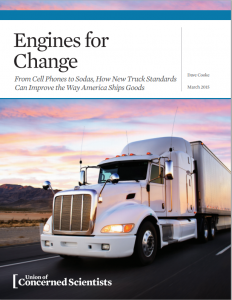Full Title: Engines for Change: From Cell Phones to Sodas, How New Truck Standards Can Improve the Way America Ships Goods
Author(s): Dave Cooke
Publisher(s): Union of Concerned Scientists
Publication Date: March 1, 2015
Full Text: Download Resource
Description (excerpt):
The United States moves more than $10 trillion worth of goods by truck each year. Nearly every product we buy— from the bed in which we awoke this morning, to the clothes we are dressed in, to the cell phone in our pocket, to the breakfast food that helps us start the day—has been on a truck at some point. While trucks carry everything from food to fuel, and from industrial equipment to animal feed, more than a third of the fuel used by trucks to move freight brings consumer goods to market. That means the fuel efficiency of trucks directly affects the costs, oil use, and global warming emissions linked to the items we purchase and use every day. The amount of fuel used to ship everyday products is staggering. Trucking the food we eat to local stores and restaurants requires more than 2.5 billion gallons of fuel. And transporting the gasoline used to do things like grocery shopping in the first place? That requires fuel, too—263 million gallons just to truck that fuel to gas stations so we can fill up our vehicles. Even trucking the 163 million cell phones sold in the United States every year to retailers and consumers uses nearly half a million gallons of fuel (Table ES-1). Heavy-duty trucks use more fuel to move freight around the country—getting food and beverages to supermarkets, transporting construction materials, and bringing orders from retailers to our door—than for any other purpose. And freight shipments consume more than 21 billion gallons of fuel annually—almost 70 gallons for every U.S. resident.
